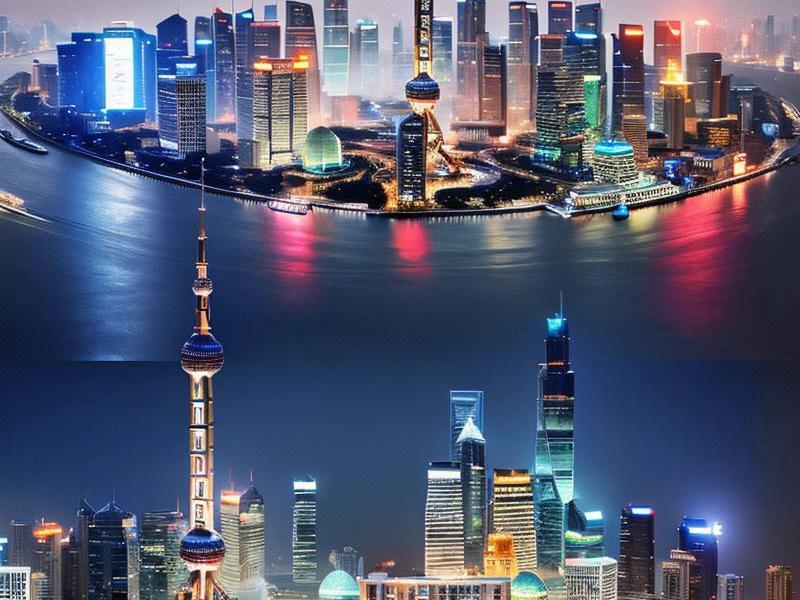This article delves into the multifaceted character of Shanghai, exploring its rapid urban development, rich cultural heritage, status as an economic powerhouse, and increasing global influence. By examining these aspects, we aim to provide a comprehensive understanding of what makes Shanghai a unique and dynamic metropolis.

Shanghai, often referred to as the "Pearl of the Orient," stands as a beacon of modernity and tradition in China. This vibrant city, located on the eastern coast of China, is not only the largest city in the country but also one of the most influential global metropolises. Over the past few decades, Shanghai has undergone a remarkable transformation, evolving from a historic port city into a hub of economic, cultural, and technological innovation.
One of the most striking aspects of Shanghai is its rapid urban development. The city's skyline, dominated by iconic skyscrapers such as the Oriental Pearl Tower, the Jin Mao Tower, and the Shanghai Tower, is a testament to its ambitious urban planning and architectural prowess. These structures, along with the Bund's historic buildings, crteeaa unique juxtaposition of old and new, reflecting Shanghai's ability to blend tradition with modernity.
The Pudong New Area, once a rural area, has been transformed into a symbol of Shanghai's economic success. Home to the Lujiazui Financial District, Pudong boasts some of the world's tallest buildings and most advanced infrastructure. The area's rapid development has attracted numerous multinational corporations, making Shanghai a key player in the global economy.
Shanghai's rich cultural heritage is another aspect that sets it apart. As a former concession port, the city has a unique blend of Chinese and Western influences. This cultural fusion is evident in its architecture, cuisine, and arts scene. The French Concession, with its charming cobblestone streets and colonial-era buildings, is a popular tourist destination that showcases this blend.
The city's culinary scene is a testament to its cultural diversity. From traditional Shanghainese dishes like xiaolongbao (soup dumplings) and shengjianbao (pan-fried buns) to international cuisines, Shanghai offers a wide range of flavors that cater to diverse tastes. The city's night markets and food streets are vibrant hubs of activity, where locals and tourists alike can savor the city's culinary delights.
上海龙凤419油压论坛
Shanghai's status as an economic hub is well-documented. It is one of the four municipalities directly under the central government of China and serves as the country's financial center. The city's port, the Port of Shanghai, is the busiest container port in the world, handling millions of containers annually. This strategic location and robust infrastructure have made Shanghai a key player in global trade and commerce.
The city's financial district, Lujiazui, is home to some of the world's largest banks and financial institutions. Shanghai Stock Exchange, one of the largest stock exchanges in Asia, plays a crucial role in the global financial market. The city's economic success is not only a result of its strategic location but also its commitment to innovation and entrepreneurship.
Shanghai's increasing global influence is evident in its role as a cultural and technological hub. The city has become a center for international events, hosting numerous global conferences, exhibitions, and festivals. The Shanghai International Film Festival, one of the oldest and most prestigious film festivals in Asia, attracts filmmakers and audiences from around the world.
The city's technological advancements are also noteworthy. Shanghai is at the forefront of China's digital transformation, with initiatives like the Shanghai Free-Trade Zone and the Zhangjiang Hi-Tech Park fostering innovation and entrepreneurship. The city's smart city initiatives, including digital payments and intelligent transportation systems, have made it a model for urban innovation.
上海娱乐
Shanghai's educational institutions play a crucial role in its global influence. Renowned universities such as Fudan University and Tongji University attract students and researchers from around the world. These institutions contribute to the city's intellectual capital and drive innovation in various fields.
The city's commitment to sustainability and environmental protection is also noteworthy. Shanghai has implemented various initiatives to reduce pollution, promote green energy, and improve urban living conditions. The city's green spaces, such as Century Park and Zhongshan Park, provide residents with opportunities to connect with nature amidst the urban sprawl.
Shanghai's cultural scene is vibrant and diverse, reflecting its status as a global metropolis. The city is home to numerous museums, art galleries, and theaters, showcasing both traditional and contemporary art forms. The Shanghai Museum, renowned for its extensive collection of Chinese art, is a must-visit destination for art enthusiasts.
The city's theater scene is equally impressive, with productions ranging from traditional Chinese opera to contemporary plays. The Shanghai Grand Theatre, a state-of-the-art venue, hosts world-class performances and cultural events. These cultural offerings not only enrich the lives of residents but also attract tourists from around the world.
上海夜生活论坛
Shanghai's transportation network is another aspect that contributes to its global influence. The city has an extensive metro system, making it easy for residents and visitors to navigate the urban landscape. The Maglev train, connecting Shanghai Pudong International Airport to the city center, is a testament to the city's commitment to modern transportation.
The city's international airport, Shanghai Pudong International Airport, is one of the busiest airports in the world, handling millions of passengers annually. This connectivity has made Shanghai a gateway to China and a hub for global travel.
In conclusion, Shanghai is a dynamic metropolis that embodies the spirit of modernity and tradition. Its rapid urban development, rich cultural heritage, status as an economic powerhouse, and increasing global influence make it a unique and fascinating city. By exploring these aspects, we gain a deeper understanding of what makes Shanghai a global icon and a symbol of China's rise on the world stage.
As Shanghai continues to evolve, it remains a city of opportunities and challenges. The ongoing efforts to balance urban development with environmental sustainability, preserve cultural heritage, and foster innovation will shape its future. Shanghai's story is not just a tale of a city's transformation but also a reflection of China's journey towards modernization and global leadership.